
Participate from wherever you are

Engage in environmental discussions and meet North American leaders
#CEC30, the 30th annual Session of the Commission for Environmental Cooperation (CEC) Council and Joint Public Advisory Committee (JPAC) Public Forum, will bring together the top environmental officials from Canada, Mexico and the United States, as well as Indigenous groups and local communities, youth, experts, and the public at large. The event will be a hybrid meeting format and will take place in Victoria, Canada, and online, on 28 and 29 June 2023, with the theme “Indigenous and Urban Approaches to Climate Adaptation.”
This year, the Honourable Steven Guilbeault, Minister of Environment and Climate Change Canada, will host his Council counterparts, Iván Rico López, Under Secretary for Environmental and Natural Resources of the Secretariat of Environment and Natural Resources of Mexico (Semarnat) and United States Environmental Protection Agency Deputy Administrator Janet McCabe.
This Council Session will reinforce trilateral commitments to preserve, protect and enhance the North American environment, and establish shared priorities and action for environmental cooperation in North America. The Session will also promote dialogue and knowledge-sharing among a diverse and intergenerational group of stakeholders. #CEC30 will also feature an exhibition and networking space, highlighting current and future CEC efforts.
The JPAC Public Forum, on Indigenous Approaches to Climate Adaptation, will serve as a platform to showcase climate adaptation stories from Indigenous communities in the three countries and discussions of the critical role of Indigenous knowledge and perspectives in shaping effective climate adaptation policies and planning efforts. During the event, Indigenous Peoples, youth, interested participants and the public will be invited to join the exchange of knowledge as panelists present their experiences and unique perspectives on climate change and highlight case studies where Traditional Ecological Knowledge (TEK) and Indigenous perspectives were integrated into climate adaptation initiatives.
Participation in the 2023 CEC Council Session and Joint Public Advisory Committee forum is open to the public and free of charge. However, virtual registration is encouraged since in-person participation is limited. Simultaneous interpretation and live streaming will be available in English, French and Spanish.
Participants are invited to register for the hybrid event here. Registrants will also be invited to join the conversation by submitting questions and comments for the public sessions via Sli.do, using #CEC30 as the event code.
For more information about CEC initiatives and news, we encourage you to sign up for our newsletter and follow us on social media.
The Commission for Environmental Cooperation (CEC) was established in 1994 by the governments of Canada, Mexico and the United States through the North American Agreement on Environmental Cooperation, a parallel environmental agreement to NAFTA. As of 2020, the CEC is recognized and maintained by the Environmental Cooperation Agreement parallel to the new Free Trade Agreement of North America. The CEC brings together a wide range of stakeholders, including the general public, Indigenous People, youth, nongovernmental organizations, academia, and the business sector, to seek solutions to protect North America’s shared environment while supporting sustainable development for the benefit of present and future generations. Find out more at: www.cec.org .
The CEC is governed and funded equally by the Government of Canada through Environment and Climate Change Canada, the Government of the United States of Mexico through the Secretaría de Medio Ambiente y Recursos Naturales, and the Government of the United States of America through the Environmental Protection Agency.
Fairmont Empress
721 Government Street
Victoria, British Columbia, Canada
V8W 1W5
(Hybrid Event)
 7:30–9:00
7:30–9:00JPAC Public Forum on Indigenous Approaches to Climate Adaptation
Climate change is impacting communities across North America, giving way to increased events such as flooding, coastal erosion, drought, fires, and heat waves, to name a few. For Indigenous communities, climate change also poses serious threats to their traditional way of life, including to their food, modes of transportation, cultural ways, and sacred sites. As North American communities face the reality of increasing climate variability, reducing vulnerability and building local resilience has become a shared priority for all three countries.
This JPAC hybrid forum will serve as a platform to showcase climate adaptation stories from Indigenous communities in the three countries and discuss the critical role of Indigenous Knowledge and perspectives in shaping effective climate adaptation policies and planning efforts.
Location: Crystal Ballroom, Fairmont Empress
 9:00–9:45
9:00–9:45 9:45–9:50
9:45–9:50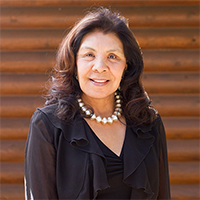
Octaviana V. Trujillo
JPAC Chair
 9:50–10:00
9:50–10:00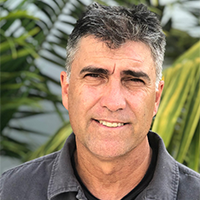
Jorge Daniel Taillant,
CEC Executive Director
 10:00–10:15
10:00–10:15
Miles G. Richardson
Chair, University of Victoria, National Consortium for Indigenous Economic Development
 10:15–10:30
10:15–10:30 10:30–12:00
10:30–12:00This session will bring together Indigenous community leaders from Canada, Mexico and the United States to showcase climate adaptation stories in the three countries. Invited speakers will share their experience and unique perspectives on climate change, how it is impacting their communities, and how they approach climate adaptation to build community resilience.
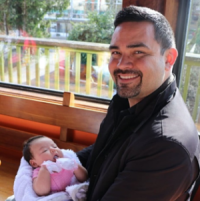
Canada: Eli Enns
President and CEO, IISAAK OLAM Foundation
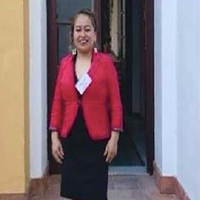
Mexico: Paulina Garrido Bonilla
Representative, the Tosepan Union of Cooperatives

United States: Frankie Myers
Vice Chairman, Yurok Tribe (virtual)
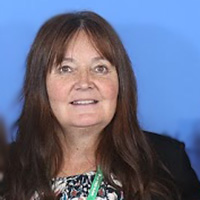
Moderator: Kathy Hodgson-Smith
TEKEG Facilitator
 12:00–13:00
12:00–13:00 13:00–14:30
13:00–14:30During this session, invited speakers will discuss the critical role of Indigenous Knowledge and perspectives in shaping effective climate adaptation policies and planning efforts. The session will highlight case studies where Traditional Ecological Knowledge (TEK) and Indigenous perspectives were integrated into climate adaptation initiatives to enhance their effectiveness and promote greater resilience to climate change impacts.

Canada: Noreen Plain Eagle
Manager, Piikani Nation Lands Department
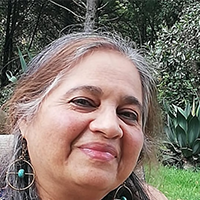
Mexico: María Lorena Soto Pinto
Researcher, Southern Border College (ECOSUR)
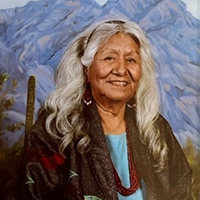
United States: Lorraine Eiler
Legislative Representative, San Lucy District, Tohono O'odham Nation
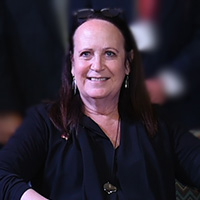
Moderator: Felicia Marcus
JPAC member
 14:30–14:40
14:30–14:40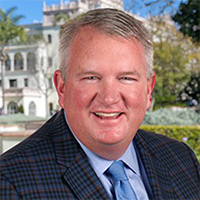
Andy Carey
US National Advisory Committee Chair

Marina Brock
Advisory Committee Chair (virtual)
 14:40–14:55
14:40–14:55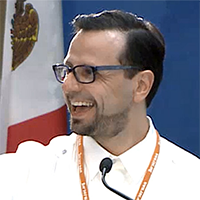
Paolo Solano
Director, Legal Affairs and Submissions on Enforcement Matters Unit
 14:55–15:00
14:55–15:00
Octaviana V. Trujillo
JPAC Chair
For registered in- person participants only
 15:00–17:00
15:00–17:00  18:30-19:00
18:30-19:00  19:00–19:45
19:00–19:45  19:45–21:00
19:45–21:00  8:00–9:00
8:00–9:00CEC Panel on Nature-Based Solutions, Environmental Justice and
Climate Adaptation in Urban Environments
Panel Format:
Keynote presentation followed by moderated panel discussion and questions/comments taken from the public, with brief responses and discussion by the experts.
Panel Focus Topic:
The global consensus and current push to accelerate climate action, including transitioning to zero-carbon economies by reducing potent greenhouse gases, to protecting and conserving natural resources which act as critical carbon sinks, to introducing nature-based solutions to promote natural cooling and build community and ecosystem resilience to the impacts of climate change, to promoting environmental justice, and to generate the financing needed for climate action to improve resilience and capacity to adapt to climate change are largely derived and occurring at an international and national level. Yet many of the actions that are needed to thwart climate change must take place at the very local level, through actions advanced by subnational governments, including states, provinces, cities and local communities.
In North America, 80% of people live in urban areas, making urban environments the space and framework through which much of today’s climate change, and responses to it, plays out. Innovative local solutions and actions to tackle climate change are happening in our cities across North America.
This session explores North American challenges and responses to climate change in the urban environment and responds to the North American Environmental Cooperation Agreement’s (ECA) mandate to facilitate partnerships, linkages and other new channels for the development and transfer of knowledge and technologies with national and subnational governments to promote the development and exchange of best practices and environmental information.
The session will gather experts from the three countries working on climate action in urban settings, offering moderated discussion and public commentary on:
Location: Crystal Ballroom, Fairmont Empress

Moderator: Evan Lloyd
(Former Deputy Minister Government Communications and Public Engagement, Government of British Columbia and former CEC Executive Director)
 9:00–9:15
9:00–9:15Opening remarks and setting the stage for a state-of-the-art discussion on urban dimensions of climate change adaptation in North America, briefly summarizing the key dimensions of the climate emergency and its evolving relevance to local level action, seeking input from invited experts and the public on ways the CEC can advance climate action in urban environments in the North American region that strengthen resilience and promote climate adaptation.

Jorge Daniel Taillant
CEC Executive Director
 9:15–9:30
9:15–9:30
Doug Smith
Deputy General Manager, Planning, Urban Design & Sustainability, City of Vancouver
 9:30–11:15
9:30–11:15 Main discussion themes:
Theme I: Municipal policy and management
Theme II: Nature-based solutions for GHG emissions, energy efficiency and cooling
Theme III: Environmental justice and community engagement
Theme IV: Opportunities for a cooperative North American agenda

Jacqueline Patterson
Executive Director, Chisholm Legacy Project, Washington, DC, United States

Deborah Carlson
Attorney, West Coast Environmental Law, British Columbia, Canada

Javier Garduño Arredondo
Lead, Latin America and the Caribbean, Red Global de Ciudades Resilientes (Resilient Cities Network)

Mario Duarte, Director,
Cultura Ambiental y Asuntos Internacionales, Secretaría de Medio Ambiente, Mexico City

Matt Holmes
Co-coordinator, California Environmental Justice Coalition (CEJC), United States California Air Resources Board-CARB
 11:15–11:30
11:15–11:30The moderator will provide a brief summary of discussions, closing the sessions and sharing highlights of the session with the Ministers during the Council Public Session in the afternoon.

Moderator, Evan Lloyd
CEC Executive Director
Council Public Meeting
Indigenous and Urban Approaches to Climate Adaptation
In accordance with the Agreement on Environmental Cooperation (ECA) Article 3(4), the CEC Council shall hold public meetings in the course of all regular sessions. These public meetings have been held since 1995 and represent a unique opportunity for North American citizens to engage with senior environmental officials and learn about North American environmental collaboration in the context of free trade as well as share their views with the Council. This year’s public meeting will focus on “Indigenous and Urban Approaches to Climate Adaptation.”
Location: Crystal Ballroom, Fairmont Empress
 14:00–14:03
14:00–14:03
Jorge Daniel Taillant
CEC Executive Director
 14:03–14:10
14:03–14:10
Jorge Daniel Taillant,
CEC Executive Director
 14:10–15:30
14:10–15:30During this session, Council members and invited experts will participate in a public dialogue on Indigenous and Urban Approaches to Climate Adaptation.
This dialogue will be moderated by Lisa Helps , former two-year term Mayor of Victoria, who will facilitate the expert dialogue and questions and answers with public participants.
The following invited experts will also participate in the dialogue with the Council on the theme: Skw’akw’as (Sunshine Lillian ) (Canada), Jamie Donatuto (US), and José Inés Loria Palma (Mexico).
 15:30–16:15
15:30–16:15The 2023 Youth Innovation Challenge invited North American youth, aged 18 to 30, to propose innovative solutions that address and respond to critical issues related to water. This 7th annual challenge, under the theme "Water Solutions for Sustainable Development," encouraged dynamic and creative young leaders to participate in actions, innovation, and transformation on issues relating to water. Winners will be announced during this session and will be invited to present their innovative solutions to the Council and the public.
 16:15–16:40
16:15–16:40 16:40–16:55
16:40–16:55